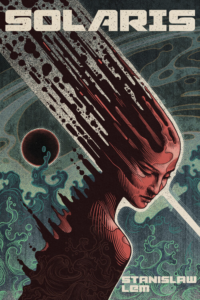Gotham Calling is still primarily a blog about comics, but I’m also enjoying posting about other books on my bedside table. They’re genre narratives as well – and many of their themes and concepts overlap with those of the comics I usually write about anyway… Yet they tend to approach these themes and concepts with remarkably different sensibilities, which makes for a stimulating change of pace.
For instance, here are a couple of futuristic novels (written in a somewhat distant past) that have recently messed with my head:
THE DEATH OF GRASS
(John Christopher, 1956)

“As sometimes happens, death healed a family breach.
When Hilda Custance was widowed in the early summer of 1933, she wrote, for the first time since her marriage thirteen years before, to her father. Their moods touched – hers of longing for the hills of Westmorland after the grim seasons of London, and his of loneliness and the desire to see his only daughter again, and his unknown grandsons, before he died.”
Read now, this apocalyptic novel about a virus that wipes out crops and the ensuing social collapse cannot help but feel as topical as ever. There are shades of the covid pandemic, with the virus initially being heartlessly – and not without racism – dismissed in the West as something that will mostly affect China, followed by growing tension – and suspicion – between the general population and the government authorities (one of the set pieces, relatively early on, involves trying to pierce through one of the road-blocks set up to prevent inter-city circulation). Likewise, the themes of famine and ecological disaster suit our age of climate crisis, as does the increasingly fashionable Darwinist mentality of survivalist narratives set in a post-state land where ruthlessness, brute force, and moral compromise are requirements.
And yet, The Death of Grass couldn’t be more of its time and place (i.e. 1950s’ England). Along with the dated gender dynamics, you have the ghosts of World War II and the postwar era, from rationing to the state of emergency, not to mention the very notion that all these civilians have enough training and nerve to roam around the countryside shooting at each other. And then, of course, there’s the Cold War, reflected not just in the subplots about atomic weapons, but also in the encompassing end-of-days vibe as well as in the level of anthropological pessimism, so characteristic of fiction from an era when humans seemed doomed to continue fighting forever (or, at least, until they destroyed their entire species).
And it’s against this backdrop that we zoom in on a small group of people trying to make it across the country as nature and society disintegrate around them…
“Tadcaster was on edge, like a border town half-frightened, half-excited, at the prospect of invasion. They filled up their tanks, and the garage proprietor looked at the money they gave him as though wondering what value it had. They got a newspaper there, too. It was a copy of the Yorkshire Evening Press – it was stamped 3d and they were charged 6d, without even an undertone of apology. The news it gave was identical with that which they had heard on the radio; the dull solemnity of the official hand-out barely concealed a note of fear.”
Part of the appeal – for me, at least – has to do with the contrast between such a sadistic scenario and a certain idealized image of British quaintness, restraint, and civilized arrogance… which gets viciously torn apart. (A few years later, Hollywood gave a similar treatment to American suburbia, in Panic in Year Zero!)
Seriously, John Christopher pulls no punches. The Death of Grass may start off with a somewhat picturesque, low-key tone, but it soon picks up speed and it just keeps cruelly escalating the stakes: horrible things happen to likable characters and everyone has to deal with the way the world has become. The prose isn’t necessarily witty or elegant, from the point of view of conventional literary standards, but the book sure is gripping as hell.
When Christopher stops for a breather and the rare existentialist musing, he earns it. There is an element of libertarian fantasy in the novel (hell, in the whole damn genre), but also a conservative streak that expects us to be shocked and indignant about the status quo of lawlessness. Such tension isn’t usually explicit, fortunately, but it does inform a number of striking passages:
“The question of whether the weather held fair would make a lot of difference to them. How easy it would be, he thought, to pray – to sacrifice, even – to the moorland gods, in the hope of turning away their wrath. He glanced at where the three boys lay curled up between Roger and Olivia. They would come to it, perhaps, or their children.
And thinking that, he felt a great weariness of spirit, as though out of the past his old self, his civilized self, challenged him to an accounting. When it sank below a certain level, was life itself worth the having any longer? They had lived in a world of morality whose lineage could be traced back nearly four thousand years. In a day, it had been swept from under them.
But were there some who still held on, still speaking the grammar of love while Babel rose all round them? If they did, he thought, they must die, and their children with them – as their predecessors had died, long ago, in the Roman arenas.”
SOLARIS
(Stanislaw Lem, 1961)

“At 19:00 hours, ship’s time, I made my way to the launching bay. The men around the shaft stood aside to let me pass, and I climbed down into the capsule.
Inside the narrow cockpit, there was scarcely room to move. I attached the hose to the valve on my space suit and it inflated rapidly. From then on, I was incapable of making the smallest movement. There I stood, or rather hung suspended, enveloped in my pneumatic suit and yoke to the metal hull.”
Set in the confines of outer space, on a research station specialized in the study of the mysterious ocean of the planet Solaris, this is a bona fide classic of hard science fiction. The book is narrated by a recently arrived psychologist, Kris Kelvin, who has to deal both with his idiosyncratic fellow scientists and with a set of extremely eerie phenomena (which, he comes to suspect, are probably a result of the latest unauthorized experiments).
The subjective perspective means that the story is as much about what is out there as about Kelvin’s own journey of discovery, especially as he is forced to confront his darkest secrets and moral dilemmas along the way. For all the psychological and emotional introspection, though, his is also an intellectual journey – and part of the appeal of Solaris is to follow the protagonists’ discussions as they debate, test, and theorize about what the hell is going on.
I’m sure I got a particular kick out of this because of my own path in academia. This is truly a novel for those who enjoy reading about science, even if it is fake science… The bulk of the second chapter is pretty much a scholarly literature review about a whole fictional field of studies, its authenticity enhanced by both detailed practical considerations and references to typical interdisciplinary disputes:
“Lack of funds delayed the departure of a proper Solaris expedition for three years. Finally Shannahan assembled his team ad obtained three C-tonnage vessels from the Institute, the largest starships of the period. A year and a half before the arrival of the expedition, which left from the region of Alpha in Aquarius, a second exploration fleet, acting in the name of the Institute, placed an automatic satellite – Luna 247 – into orbit around Solaris. This satellite, after three successive reconstructions at roughly ten-year intervals, is still functioning today. The data it supplied confirmed beyond doubt the findings of the Ottenskjöld expedition concerning the active character of the ocean’s movements.
One of Shannahan’s ships remained in orbit, while the two others, after some preliminary attempts, landed in the southern hemisphere, in a rocky area about 600 miles square. The work of the expedition lasted eighteen months and was carried out under favourable conditions, apart from an unfortunate accident brought about by the malfunction of some apparatus. In the meantime, the scientists had split into two opposing camps; the bone of contention was the ocean. On the basis of the analyses, it had been accepted that the ocean was an organic formation (at that time, no one had yet dared to call it living). But, while the biologists considered it as a primitive formation – a sort of gigantic entity, a fluid cell, unique and monstrous (which they called ‘prebiological’), surrounding the globe with a colloidal envelope several miles thick in places – the astronomers and physicists asserted that it must be an organic structure, extraordinarily evolved.”
I love all the world-building, explicit and implicit. The surnames of the scholars and cosmonauts suggest a future in which space exploration has become a globalized, international affair, which was itself quite a sci-fi notion back in 1961, when Solaris was first published, in communist Poland.
But Stanislaw Lem, one of the most acclaimed sci-fi writers ever, hasn’t just crafted a thorough and richly complex fictional place – this is a first contact narrative, imagining the implications of encountering an alien life form so baffling that it challenges our scientific and ethical foundations. Existentialist and ultimately metaphysical in the questions it raises, Solaris is a book about trying to grasp incommensurable magnitude and, therefore, about dealing with the limits of knowledge and the challenges of translation.
Then again, distant galaxies have always been a fertile ground for Eastern Bloc science fiction. In spaceships and space stations like the one in Solaris, geographically (and chronologically) removed from the Earth’s dictatorships, readers get to follow isolated characters who freely debate and make choices away from the gaze – and the chain of command – of the authorities.
And along with the politics of contrast with everyday reality, you also have more timeless themes, as a couple of characters directly denounce anthropocentrism and the impulse to conceptualize difference through analogies, correspondences, and projections of ourselves. The result is a stirring, thought-provoking read.
“We take off into the cosmos, ready for anything: for solitude, for hardship, for exhaustion, death. Modesty forbids us to say so, but there are times when we think pretty well of ourselves. And yet, if we examine it more closely, our enthusiasm turns out to be all sham. We don’t want to conquer the cosmos, we simply want to extend the boundaries of Earth to the frontiers of the cosmos. For us, such and such a planet is as arid as the Sahara, another as frozen as the North Pole, yet another as lush as the Amazon basin. We are humanitarian and chivalrous; we don’t want to enslave other races, we simply want to bequeath them our values and take over their heritage in exchange. We think of ourselves as the Knights of the Holy Contact. This is another lie. We are only seeking Man. We have no need of other worlds. We need mirrors. We don’t know what to do with other worlds. A single world, our own, suffices us; but we can’t accept it for what it is. We are searching for an ideal image of our own world: we go in quest of a planet, of a civilization superior to our own but developed on the basis of a prototype of our primeval past.”
